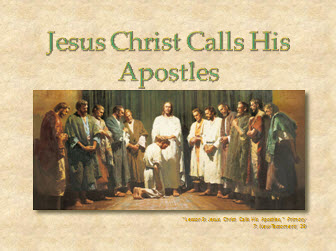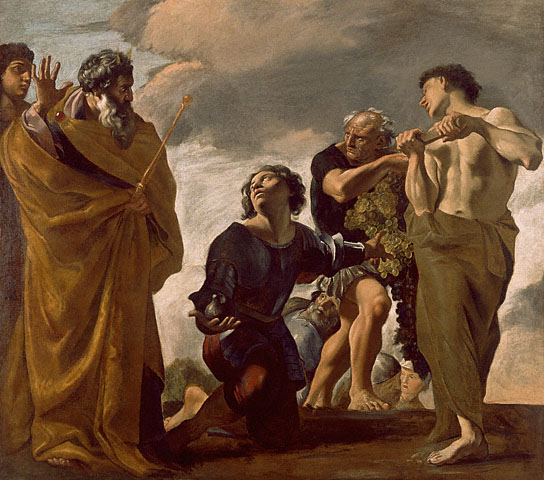The enigmatic disappearance of Jesus' Twelve (12) Disciples [from the New Testament] has been an ongoing mystery for many centuries and only a variety of ancient traditions is left for mankind to ponder upon. Little can be gleaned from the New Testament, but a few sources [such as Hippolytus and Eusebius of Rome] offer a peek into the fates of the 12 Apostles.
The New Testament only mentions the death of two disciples: Judas Iscariot (Matthew 27:1-5) and James [son of Zebedee] (Acts 12:1-2). The details of what happened to the other ten disciples are based upon the writings of the early Christian historians.
The Apostolic Lists of the Twelve Disciples:
Matthew 10:2-4
"Now the names of the twelve apostles are these; The first, Simon, who is called Peter, and Andrew his brother; James the son of Zebedee, and John his brother; Philip, and Bartholomew; Thomas, and Matthew the publican; James the son of Alphaeus, and Lebbaeus, whose surname was Thaddaeus; Simon the Canaanite, and Judas Iscariot, who also betrayed him."
Mark 3:14-19
"And he ordained twelve, that they should be with him, and that he might send them forth to preach, And to have power to heal sicknesses, and to cast out devils: And Simon he surnamed Peter; And James the son of Zebedee, and John the brother of James; and he surnamed them Boanerges, which is, The sons of thunder: And Andrew, and Philip, and Bartholomew, and Matthew, and Thomas, and James the son of Alphaeus, and Thaddaeus, and Simon the Canaanite, And Judas Iscariot, which also betrayed him: "
Luke 6:13-16
"And when it was day, he called unto him his disciples: and of them he chose twelve, whom also he named apostles; Simon, (whom he also named Peter,) and Andrew his brother, James and John, Philip and Bartholomew, Matthew and Thomas, James the son of Alphaeus, and Simon called Zelotes, And Judas [Thaddeaus] the brother of James, and Judas Iscariot, which also was the traitor."
Acts 1:12-13
"Then returned they unto Jerusalem from the mount called Olivet, which is from Jerusalem a sabbath day's journey. And when they were come in, they went up into an upper room, where abode both Peter, and James, and John, and Andrew, Philip, and Thomas, Bartholomew, and Matthew, James the son of Alphaeus, and Simon Zelotes, and Judas [Thaddeaus] the brother of James." (Note: Judas Iscariot was dead and therefore not numbered among the Disciples in Luke's writing of the Acts.)

The Fates of the Disciples:
Matthew 10:2-4
"Now the names of the twelve apostles are these; The first, Simon, who is called Peter, and Andrew his brother; James the son of Zebedee, and John his brother; Philip, and Bartholomew; Thomas, and Matthew the publican; James the son of Alphaeus, and Lebbaeus, whose surname was Thaddaeus; Simon the Canaanite, and Judas Iscariot, who also betrayed him."
Mark 3:14-19
"And he ordained twelve, that they should be with him, and that he might send them forth to preach, And to have power to heal sicknesses, and to cast out devils: And Simon he surnamed Peter; And James the son of Zebedee, and John the brother of James; and he surnamed them Boanerges, which is, The sons of thunder: And Andrew, and Philip, and Bartholomew, and Matthew, and Thomas, and James the son of Alphaeus, and Thaddaeus, and Simon the Canaanite, And Judas Iscariot, which also betrayed him: "
Luke 6:13-16
"And when it was day, he called unto him his disciples: and of them he chose twelve, whom also he named apostles; Simon, (whom he also named Peter,) and Andrew his brother, James and John, Philip and Bartholomew, Matthew and Thomas, James the son of Alphaeus, and Simon called Zelotes, And Judas [Thaddeaus] the brother of James, and Judas Iscariot, which also was the traitor."
Acts 1:12-13
"Then returned they unto Jerusalem from the mount called Olivet, which is from Jerusalem a sabbath day's journey. And when they were come in, they went up into an upper room, where abode both Peter, and James, and John, and Andrew, Philip, and Thomas, Bartholomew, and Matthew, James the son of Alphaeus, and Simon Zelotes, and Judas [Thaddeaus] the brother of James." (Note: Judas Iscariot was dead and therefore not numbered among the Disciples in Luke's writing of the Acts.)

Andrew – Tradition teaches that Andrew was martyred in Greece. One account says he led the wife of a Roman governor to believe in Jesus. As a result, Andrew was killed. Some think he was crucified and continued to share the message of Jesus until the very end. For more information, visit Andrew and John, Disciples of John the Baptist
Bartholomew - also known as Nathanael, was flayed (skinned) alive and then beheaded according to the ancients. He spread the gospel of Jesus in India and Armenia (present day Armenia, eastern Turkey, northern Iraq, north western Iran). Some believe that present day Baku on the Caspian Sea may have been the location of his martyrdom. For more information, visit Bartholomew the Apostle
James, son of Alphaeus - also known as James the Lesser, was supposedly stoned to death and buried beside the temple in Jerusalem. Traditional legend claims that James was thrown down by the Pharisees, stoned and his brains dashed out with a fuller's club. For more information, visit James the Lesser
James, son of Zebedee - also known as James the Greater and the brother of John, was executed by Herod Agippa I shortly before the Passover around c/44 AD. (Acts 12:1-2) James' ministry was taught throughout Jerusalem and Judea. Some legends attribute his evangelistic endeavours led him to Spain, as well. For more information, visit James the Greater
John - was the brother of James and the son of Zebedee and one of the only disciples to experience a natural death around a conjectured date of c/100 AD. His teachings of Jesus took him throughout Jerusalem, Ephesus (present day Turkey) and most of Asia Minor. John was banished to the Isle of Patmos (a present day Greek island in the Aegean Sea) by either Emperor Nero [of Rome] or Domitian [of Patmos] and it was there that the Book of Revelation was revealed to him. For more information, visit John of Patmos
Judas Iscariot - According to Matthew 27:3-10 and Acts 1:18-19 [briefly described by Luke], Judas Iscariot killed himself not long after the betrayal of Jesus [to the Jewish authorities]. Some stories claim he hung himself and other tales state that he fell down a precipice in the valley of Hinnom, near Jerusalem and was dashed into pieces. The thirty pieces of silver (used in the betrayal) that was given to Judas was used to purchase a Potter's Field (burial ground) for foreigners and it was named the "Field of Blood" (even unto the present day). for more information, visit Judias Iscariot
Matthew - also known as Levi, preached the gospel in Judea and possibly Ethiopia and Persia. While not alot of information is available concerning Matthew, according to Eusebius he referenced Bishop Papias of Hierapolis (c/110 AD) as bearing witness to Matthew's authorship of his gospel. Hippolytus places his missionary work as being in Persia, Parthia and the general location of the Medes and was martyred at Parthia [near present day Tehran]. For more information, visit Matthew the Tax Collector
Philip - was instrumental in spreading the gospel of Jesus in Phrygia (located in present day Turkey). It is unclear how he actually died, but some sources say it was by stoning and others claim he was crucified [with his head down]. Either way his martyrdom took place at Heliopolis. For more information, visit Tomb of the Apostle Philip is found in Hierapolis.
Simon - who was later known as Peter, had a ministry that endured for over 30 years (according to tradition). Legend has it that he was martyred at Rome between 64-67 AD by crucifixion. All accounts of his death are agreed upon that Simon Peter [at his own request] was crucified with his head downward as he did not feel worthy to be put to death in the same manner as Jesus. Later traditions claim that St. Peter's in Rome was built over his grave. For more information, visit Simon Peter the Apostle
Simon the Zealot - also known as Simon the Canaanite, supposedly took his ministry north and preached in the British Isles (although this has not been proven). Not much is known about him other than he became the second Bishop of Jerusalem. Most believe that he was martyred too. For more information, visit Simon the Zealot
Thaddaeus - also known as Jude/Judas [who is also called Lebbaeus] preached to the people throughout Mesopotamia. Later he ministered in Assyria (present day eastern Iraq) and Persia (present day Iran) and his ministry joined forces with Simon the Zealot. It is believed that both disciples were killed at Berytus (present day Kara Kalisa in Iran) and buried there. For more information, visit Jude the Apostle
Thomas - Hippolytus records that Thomas [Didymus] was an active missionary and he met his fate in India by being speared to death. According to some, his gospel was spread throughout Parthia (present day Iraq and Iran) while other traditions link him with southern India as well. All traditions agree that he was killed by a lance or spear. For more information, visit The Doubting Thomas
Many readers of the New Testament find themselves wondering what happened to Jesus' Twelve Disciples, yet it remains a mystery unto this day. Speculation about the outcome and demise of these men may throw some light on the subject, but does not prove the ancient traditions of probability.
Such traditions also apply to the Apostle Paul [Saul of Taurus] who was converted to Christianity (after Jesus' resurrection) and preached the gospel [as far as Italy and Spain] for over 35 years during the time of Roman Emperor Nero and was said to have been beheaded in Rome and buried there. Matthias, who replaced Judas Iscariot, was later numbered along with the eleven remaining disciples. He was said to have preached in Jerusalem and was buried there. It is unknown how Matthias died.
Following the ascension of Jesus into heaven, His disciples went out and had tremendous impact on the world! They took the gospel of Jesus to far-off places and also left us the legacy of the New Testament. They used the training Jesus gave them to impact and encourage Christians in their faith. Yet, the question remains ... What really happened to them?
 |
| Map - Traditional Locations Where the Disciples Preached and Died |
Many readers of the New Testament find themselves wondering what happened to Jesus' Twelve Disciples, yet it remains a mystery unto this day. Speculation about the outcome and demise of these men may throw some light on the subject, but does not prove the ancient traditions of probability.
Such traditions also apply to the Apostle Paul [Saul of Taurus] who was converted to Christianity (after Jesus' resurrection) and preached the gospel [as far as Italy and Spain] for over 35 years during the time of Roman Emperor Nero and was said to have been beheaded in Rome and buried there. Matthias, who replaced Judas Iscariot, was later numbered along with the eleven remaining disciples. He was said to have preached in Jerusalem and was buried there. It is unknown how Matthias died.
Following the ascension of Jesus into heaven, His disciples went out and had tremendous impact on the world! They took the gospel of Jesus to far-off places and also left us the legacy of the New Testament. They used the training Jesus gave them to impact and encourage Christians in their faith. Yet, the question remains ... What really happened to them?



